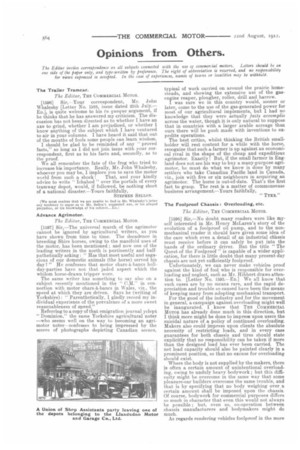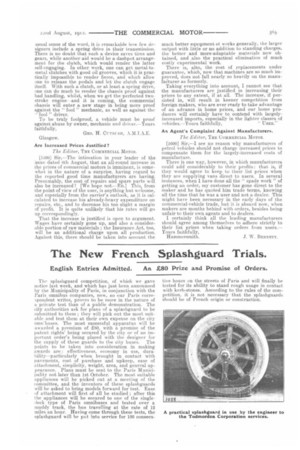Opinions from Others.
Page 14

Page 15

If you've noticed an error in this article please click here to report it so we can fix it.
The Editor invites correspondence on all subjects connected with the use of commercial motors. Letters should be on one side of the paper only, and type-written by Preference. The right of abbreviation is reserved, and no responsibility for views expressed is accepted. In the case of experiences, names of towns or localities may be withheld.
The Trailer Tramcar.
The Editor, THE COMMERCIAL MOTOR.
[1596] Sir,—Your correspondent, Mr. John Whalesby [Letter No. 1588, issue dated 2.5th
ED.], is quite welcome to his tu quo vie argument, if he thinks that he has answered my criticism. The discussion has not been directed as to whether I have an axe to grind, whether I am prejudiced, or whether I know anything of the subject which I have ventured to air in your columns. I have heard it said that out of the mouths of fools some people can learn wisdom.
I should be glad to be reminded of any "proved facts," so long as I did not join issue with your correspondent, first as to his facts and, secondly, as to the ,proof.
e all remember the fate of the frog who tried to increase his importance. Really, Mr. John Whales-by, whoever you may be, I implore you to save the motor
world from such a shock ! That, and your kindly advice to write " Ichabod " over the portals of every tramway depot, would, if followed, be nothing short of a national disaster.—Yours faithfully, STEPHEN SELLON.
[We must confess that we are unable to find in Mr. Whalesby's letter any tendency to argue as to Mr. Selina's, suggested axe, or his alleged prejudice, or his knowledge of his subject—Ey.]
Advance Agrimotor.
The Editor, THE COMMERCIAL MOTOR.
[1597] Sir,—The universal march of the agrimotor cannot be ignored by agrieultural writers, as you have shown from time to time. The decadence in breeding Shire horses, owing to the manifold uses of the motor, has been mentioned ; and now one of the leading writers in the north is pertinently and half. pathetically asking : "Has that most useful and sagacious of our domestic animals (the horse) served his day ? " He confesses that motor chars-à-bancs holiday-parties have not that jaded aspect which the whilom horse-drawn tripper wore. The same writer has something to say also an a subject recently mentioned in the " C.M." in connection with motor chars-h-bancs in Wales, viz., the speed at which they are driven. Says he (writing of Yorkshire): " Parenthetically, I gladly record my individual experience of the prevalence of a more sweet reasonableness of speed." Referring to a copy of that emigration journal yclept " Dominion," the same Yorkshire agricultural noter —who seems well on the way to becoming an agrimotor noter—confesses to being impressed by the scores of photographs depicting Canadian scenes,
typical of work carried on around the prairie homesteads, and showing the extensive use of the gamengine reaper, plougher, roller, drill and harrow. I was sure we in this country would, sooner or later, come to the use of the gas-generated power for most of our agricultural implements, but I had no knowledge that they were actually faits accoraplis across the water, though it is only natural to suppose that in countries with a larger arable acreage than ours there will be push made with inventions to expedite operations. The best critics, whilst thinking the British smallholder will rest content for a while with the horse, recognize that such a farmer is up against an economical rival in the shape of the cheap and expeditious agrimotor. Exactly ! But, if the small farmer in England does not see his way to buy a many-purpose agrimotor, he must do what we know is done by many settlers who take Canadian Pacific land in Canada, viz., join with five or six neighbours in acquiring an agrimotor. The horse is out-of-date. That's the first fact to grasp. The rest is a matter of commonsense business arrangement.—Yours faithfully,
The Foolproof Chassis : Overloading, etc.
The Editor, THE COMMERCIAL MOTOR.
[1598] Sir,—No doubt many readers were like myself interested in Mr. Henry McLaren's story of the evolution of a foolproof oil pump, and to the nonmechanical reader it should have given some idea of the care which even a detail of an industrial clfassis must receive before it can safely be put into the hands of the ordinary driver. But the title " The Quest of the Foolproof" is capable of a wider application, for there is little doubt that many present-day chassis are not yet sufficiently foolproof.
Unfortunately, we can never make vehicles proof against the kind of fool who is responsible for overloading and neglect, such as Mr. Hibbert draws attention to. [Letter No. 1593.--En.] We all know that such cases are by no means rare, and the rapid depreciation and trouble so caused have been the means of keeping many from adopting mechanical transport.
For the good of the industry and for the movement in general, a campaign against overloading might well be inaugurated. I know that THE COMMERCIAL MOTOR has already done much in this direction, but I think more might be done to imp rem upon users the suicidal nature of a policy of continued overloading. Makers also could impress upon clients the absolute necessity of restricting loads, and in every case guarantees for both chassis and tires should state explicitly that no responsibility can be taken if more than the designed load has ever been carried. The net load capacity should also be painted clearly in a prominent position, so that no excuse for overloading should exist.
Where the body is not supplied by the makers, there is often a certain amount of unintentional overloading, owing to unduly heavy bodywork ; but this difficulty might be overcome in the same way that some pleasure-car builders overcome the same trouble, and that is by specifying that no body weighing over a certain amount shall be imposed upon the chassis. Of course, bodywork for commercial purposes differs So much in character that even this would not always he possible ; but, even so, co-operation between chassis manufacturers and bodymakers might do much.
As regards rendering vehicles foolproof in the more usual sense of the word, it is remarkable how few designers include a spring drive in their transmission. There is no doubt that such a device saves tires and gears, while another aid would be a dashpot arrangement for the clutch, which would render the latter self-engaging. In other work, one can get metal-tometal clutches with good oil grooves, which it is practically impossible to render fierce, and which allow one to release the pedals and let the clutch engage itself. With such a clutch, or at least a spring drive, one can do much to render the chassis proof against bad handling, whilst, when we get the perfected twostroke engine—and it is coming, the commercial chassis will enter a. new stage in being more proof against the " fool" mechanic, as well as against the fool " driver.
To be truly foolproof, a vehicle must be proof against abuse by owner, mechanic and driver.—Yours faithfully,
GEO. H. CETRU•SH,
Glasgow.
Are Increased Prices Justified?
The Editor, THE COMMERCIAL MOTOR.
[1599] Sir,—The intimation in your leader of the issue dated Sth August, that an all-round increase in the prices of commercial motors is imminent, is somewhat in the nature of a surprise, having regard to the reported good time manufacturers are having. Presumably, the cost of repairs and spare parts will also be increased? [We hope not.—En.] This, froth the point of view of the user, is anything but welcome, and especially from the carrier's outlook, as it is calculated to increase his already-heavy expenditure on repairs, etc., and to decrease his too slight a margin of profit_ It is quite unlikely that his rates will go up correspondingly.
That the increase is justified is open to argument. Wages have certainly gone up, and also a oonsiderable portion of raw materials ; the Insurance Act, too, will be an additional charge upon all production. Against this, there should be taken into account the much better equipment at works generally, the larger output with little or no addition to standing charges, the better and more-adaptable materials now obtained, and also the practical elimination of much costly experimental work. There is, also, the cost Of replacements under guarantee, which, now that machines are so much improved, does not fall nearly so heavily on the mannfaCturer as formerly.
Taking everything into account, I cannot see that the manufacturers are justified in increasing their prices to any extent, if at all. The increase, if persisted in, will result in keener competition from foreign makers, who are ever ready to take advantage of an advance in home prices, and our home producers will certainly have to contend with largelyincreased imports, especially in the lighter classes of vehicles.—Yours faithfully, " USER."
An Agent's Complaint Against Manufacturers.
The Editor, THE COMMERCIAL MOTOR.
[1600] Sir,—I see no reason why manufacturers of petrol vehicles should not charge increased prices to compensate them for the largely-increased costs of manufacture.
There is one way, however, in which manufacturers could add considerably to their profits: that is, if they would agree to keep to their list prices when they are supplying vans direct to users. In several instances, when I have done all the spade work" of getting an order, my customer has gone direct to the maker and he has quoted him trade terms, knowing all the time that he was a user and not a dealer. This might have been necessary in the early days of the commercial-vehicle trade, hut it is absurd now, when makers are months behind with orders, besides being unfair to their own agents and to dealers.
I certainly think all the leading manufacturers should agree among themselves to adhere strictly to their list prices when taking orders from users.— Yours faithfully, Hammersmith. J. W. BENNETT.




















